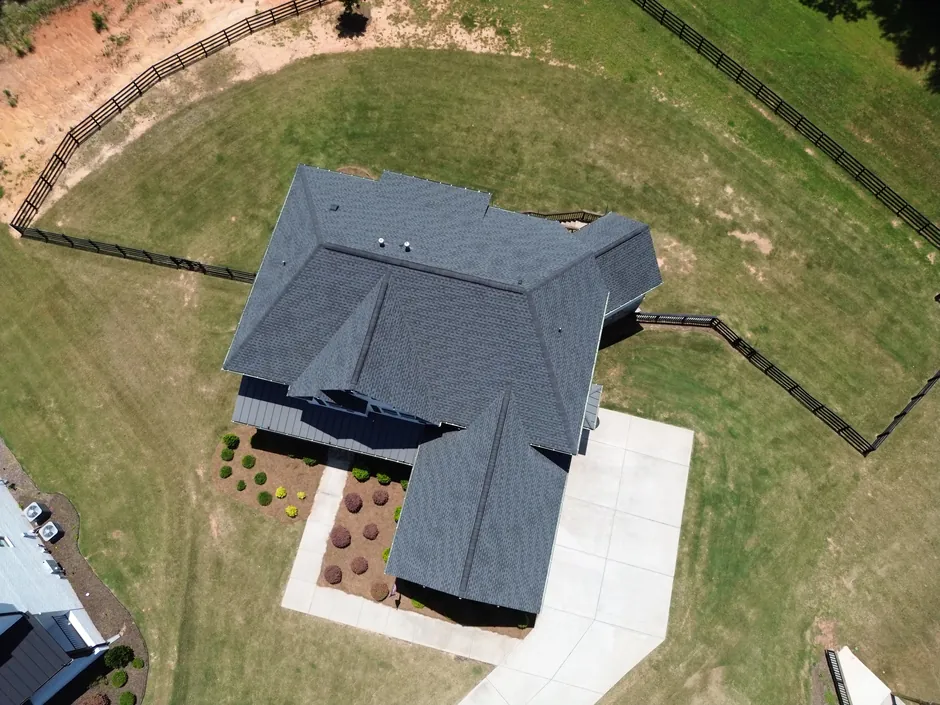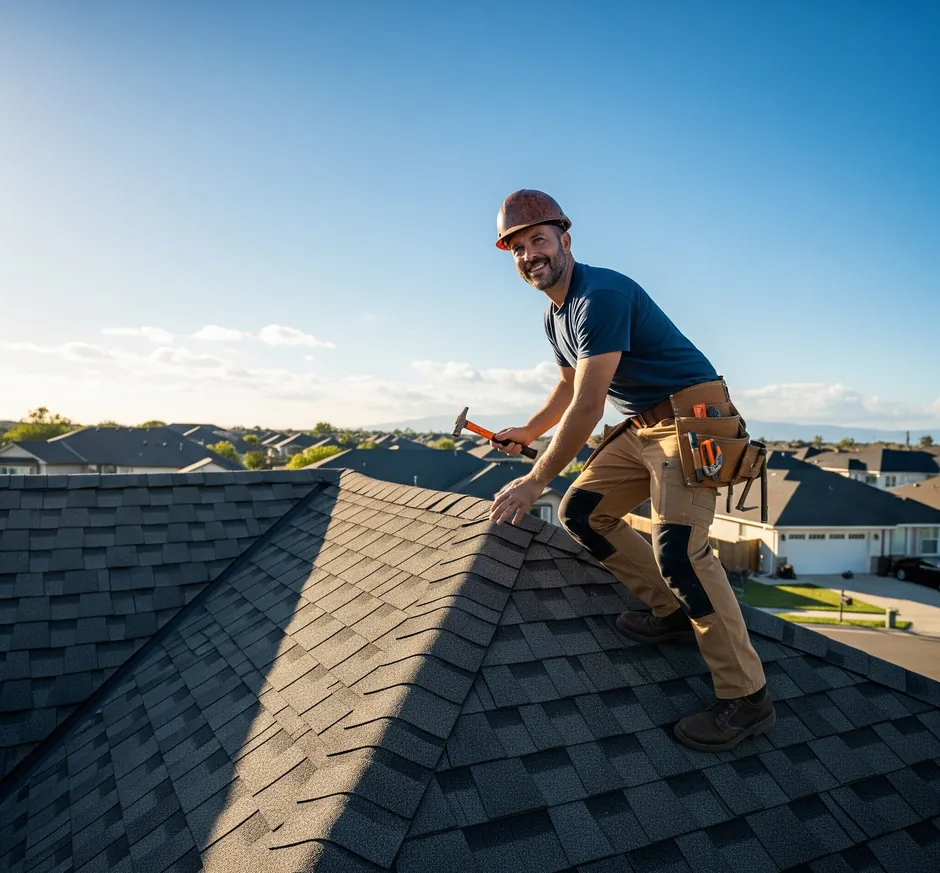
Roof Inspection Sugar Hill
Sugar Hill Roof Inspection
Sugar Hill’s rapid growth and transformation from a small town to a burgeoning suburban city present unique challenges in roof inspection. From older established neighborhoods to new mixed-use developments, Sugar Hill’s diverse architectural landscape demands a nuanced approach to roof assessment. This technical guide offers property owners, managers, and inspectors detailed insights into inspection methodologies, local building codes, and specific challenges encountered in Sugar Hill’s evolving roofing environment.
Core Components of Sugar Hill Roof Inspections
A thorough roof inspection in Sugar Hill typically encompasses the following key areas:
-
Structural Integrity Evaluation
- Assessment of roof decking condition, particularly important in Sugar Hill’s older homes
- Inspection of truss and rafter systems, with attention to both traditional and modern framing methods
- Evaluation of roof pitch adequacy, crucial in Sugar Hill’s varied topography
-
Roofing Material Analysis
- Detailed examination of asphalt shingles, the predominant material in Sugar Hill’s residential areas
- Assessment of metal roofing systems, increasingly popular in Sugar Hill’s new constructions
- Evaluation of synthetic slate and tile used in some of Sugar Hill’s upscale developments
-
Water Intrusion Detection
- Utilization of infrared thermography for non-invasive moisture detection
- Inspection of flashing integrity, particularly around Sugar Hill’s numerous dormers and skylights
- Assessment of gutter and downspout systems, critical in Sugar Hill’s areas with significant elevation changes
-
Energy Efficiency Assessment
- Thermal imaging to evaluate insulation effectiveness, important for both older and newer Sugar Hill homes
- Analysis of attic ventilation systems, crucial in Sugar Hill’s hot, humid climate
- Evaluation of radiant barrier installations in Sugar Hill’s newer energy-efficient homes
-
Environmental Impact and Durability Check
- Inspection for wind damage resistance, important due to Sugar Hill’s occasional severe weather
- Assessment of algae and moss growth, common in Sugar Hill’s more shaded neighborhoods
- Evaluation of UV damage, particularly on south-facing slopes in Sugar Hill’s hilly terrain
Advanced Inspection Techniques for Sugar Hill Properties
Sugar Hill’s roofing professionals employ several cutting-edge techniques:
-
Drone-Assisted Aerial Inspections
- High-resolution imagery for detailed visual analysis of hard-to-reach areas
- 3D modeling of complex roof structures, particularly useful for Sugar Hill’s newer mixed-use buildings
- Thermal mapping to identify hot spots and potential insulation failures
-
Non-Destructive Testing (NDT) Methods
- Ultrasonic pulse echo testing for assessing material thickness and integrity
- Electronic leak detection for pinpointing breaches in flat commercial roofs
- Moisture meter scanning for detecting subsurface dampness in roof decking
-
Digital Documentation and Analysis
- Use of cloud-based platforms for real-time data collection and reporting
- Implementation of AI-driven image analysis for defect detection
- Integration with building information modeling (BIM) systems for comprehensive property management
 Figure 1: Advanced roof inspection technologies utilized in Sugar Hill, showcasing drone technology and non-destructive testing applications
Figure 1: Advanced roof inspection technologies utilized in Sugar Hill, showcasing drone technology and non-destructive testing applications
Sugar Hill-Specific Inspection Protocols
Inspectors in Sugar Hill must adhere to local regulations and address unique regional factors:
-
New Development Considerations
- Compliance with Sugar Hill’s updated 2024 building codes for new constructions
- Verification of proper installation in rapidly built developments
- Assessment of roofing material compatibility with Sugar Hill’s architectural guidelines
-
Established Neighborhood Focus
- Evaluation of long-term weathering effects on older Sugar Hill homes
- Inspection for proper integration of repairs and renovations with original roofing systems
- Assessment of drainage adequacy in Sugar Hill’s older, less-planned neighborhoods
-
Mixed-Use Development Specializations
- Comprehensive evaluation of diverse roofing systems within single structures
- Inspection of green roofing elements in Sugar Hill’s newer eco-friendly developments
- Assessment of rooftop amenity spaces common in Sugar Hill’s modern mixed-use buildings
-
Topographical Adaptations
- Inspection for proper water flow management on steeply pitched roofs
- Evaluation of snow and ice dam prevention measures in Sugar Hill’s more elevated areas
- Assessment of wind uplift resistance, particularly important in Sugar Hill’s higher elevations
Sugar Hill Roof Inspection Regulations and Requirements
Understanding local regulations is crucial for property owners and inspectors in Sugar Hill:
-
Inspection Frequency
- Annual inspections recommended for all commercial properties
- Bi-annual inspections required for buildings over 20,000 square feet
- Post-storm inspections mandated for all municipal buildings and recommended for private properties
-
Certification Requirements
- Inspectors must hold a valid Georgia state license
- Additional certification in green roofing systems required for inspecting eco-friendly developments
- Drone operators must comply with Sugar Hill’s UAV ordinances and FAA regulations
-
Reporting Standards
- Digital reports must be filed with Sugar Hill’s Building Department for all commercial inspections
- Use of standardized assessment forms required to ensure consistency across inspections
- Inclusion of energy efficiency ratings mandatory in all inspection reports as of 2024
-
Energy Efficiency Compliance
- All inspections must include an energy performance evaluation
- Verification of cool roofing compliance for new commercial constructions and major renovations
- Documentation of insulation R-values and ventilation adequacy in all residential inspections
-
Environmental Considerations
- Assessment of stormwater management systems integrated with roofing
- Evaluation of solar panel integration and impact on roof integrity
- Inspection for proper disposal or recycling plans for roofing materials in compliance with Sugar Hill’s sustainability initiatives
Preparing for a Roof Inspection in Sugar Hill
Property owners can take several steps to ensure a thorough and efficient inspection:
-
Documentation Gathering
- Compile all previous inspection reports, repair records, and original installation documentation
- For newer properties, gather all warranty information and builder specifications
- Prepare a log of any known issues or recent changes to the roof
-
Access Facilitation
- Ensure clear access to all roof areas, including any locked or restricted sections
- Trim overhanging branches that may impede inspection
- Clear the area around the building to allow for proper placement of inspection equipment
-
Interior Preparation
- Provide access to attic spaces or upper floors for interior inspection components
- Remove or cover stored items in attic spaces to allow for thorough examination
- Inform occupants about the inspection to ensure cooperation and minimal disruption
-
Systems Coordination
- For commercial properties, coordinate with HVAC technicians to provide access to rooftop units
- Arrange for temporary deactivation of any solar panel or green roof irrigation systems for safe inspection
- Ensure security systems are notified to prevent false alarms during the inspection process
-
Post-Inspection Planning
- Schedule a detailed review session to discuss the inspection findings
- Prepare for potential follow-up assessments, especially if specialized testing is recommended
- Allocate resources for addressing any critical issues identified during the inspection
Safeguarding Sugar Hill’s Roofing Assets Through Expert Inspection
Comprehensive and regular roof inspections are essential for maintaining the integrity and longevity of Sugar Hill’s diverse property types. By leveraging advanced technologies, adhering to local regulations, and employing specialized techniques, property owners can protect their investments and ensure the ongoing performance of their roofing systems.
Whether you own an established home in one of Sugar Hill’s older neighborhoods, manage a new commercial complex, or oversee a modern mixed-use development in the downtown area, partnering with certified inspectors who understand Sugar Hill’s unique roofing landscape is crucial. Regular, professional inspections not only prevent costly damages but also contribute to the overall resilience, energy efficiency, and aesthetic appeal of Sugar Hill’s built environment.